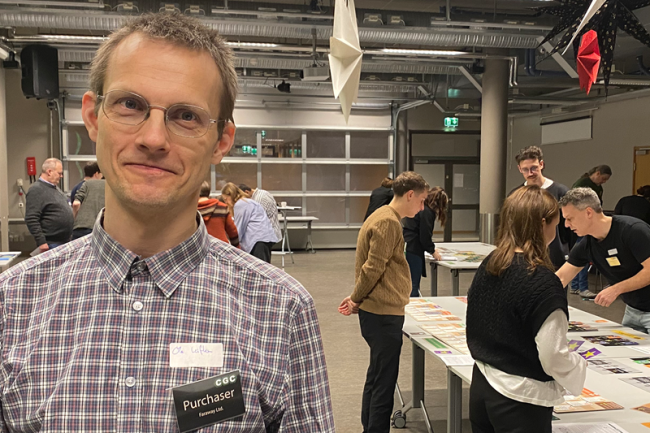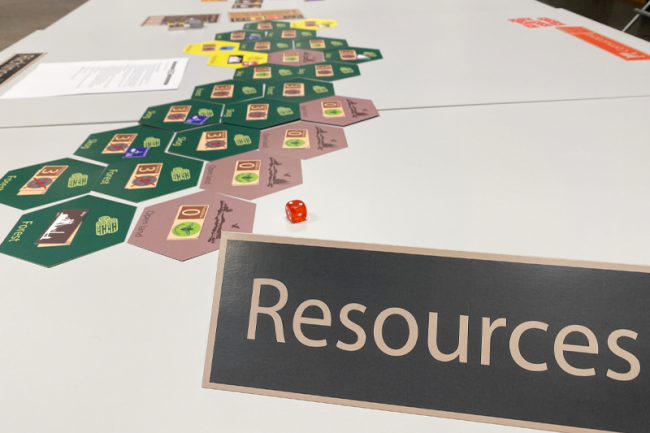Megagame – simulating reality as a learning tool
2025-02-05Megagames are a mix of role-playing games, board games and simulation. Karlstad University organised a megagame on the theme: Can Sweden reach sustainable consumption by 2045?
Our society is based on economic growth. With growth comes increased consumption, higher energy costs and use of resources. Without growth, unemployment goes up. With technology comes greater efficiency, convenience and security. The downside of technology is that it is resource-intensive and leads to forced behaviours. How can society find a balance in all of this? It is a big task. The game board is even bigger. Not to say enormous.
The participants in a megagame play different roles – politicians, producers, high-, low-, and middle-income earners, as well as the media. Everyone listens attentively to the game leader. Solving the task requires cooperation across many sectors.
Ola Leifler, senior lecturer in computer science at Linköping University and game leader, is convinced that our understanding of society at large increases drastically by participating in a megagame.
– This way of acquiring knowledge is much better than reading literature or attending lectures. At a previous megagame with upper-secondary school students, the participants were asked to make political decisions that would affect workers. Seeing the effects of these decisions is valuable for gaining an understanding of society at large. The game focuses on an experience that can be linked to different aspects afterward.
This particular game is about consumption – what results and insights can the participants expect?
– A common perception is that consumption is about individual choices in a store, says Ola Leifler. In this game, there are raw materials, energy, resources, production and consumption – and they are all interconnected, forming an economy and creating a social structure. If you want to change consumption, you need to make decisions that are not just about the choice of store. The game provides insight into the relationships between all the different actors and also shows opportunities to influence development in various ways.
John Sören Pettersson is a professor of information systems at Karlstad Business School and was given the role as one of several buyers.
– It’s a complicated game, and an hour into it, I’m not sure how to invest as a buyer. As the game progresses, the harder it is to predict what will happen. But learning what people buy and how to find labour and quality raw materials is the whole point of playing.
A bell rings in the room. This means that the market is open and participants from different income levels in society can consume what the producers have to offer in the form of travel, food and goods. Deals are made where both new products, second-hand products and services change owner. All purchases are recorded and affect how sustainable society is after the round of trading. In one of the rooms, the government sits and makes decisions that impact more or less everything.
– I have two government posts, says Jenny Karlsson at Karlstad Business School, and shows the signs of both Minister for Business and Industry and Minster for Energy. Right now, I may have caused a company to go bankrupt because of a government decision. But it has been interesting to get an overview of everything that takes place in production, consumption, research and how resources are managed. It has been challenging to organise all the demands from society and present them to the Prime Minister and the government, who have had to make major decisions based on my work. What stands out most to me is the importance of communication and how exciting it is to try out new pedagogical tools.
Emelie Hindersson, coordinator at the Centre for Societal Risk Research at Karlstad University, was responsible for the global market and its resources. At the end of the game, she was happy with the day.
– I sold to producers, which then turned into products for the market. I had high expectations and it was truly an experience. Playing this game has been both intense and confusing as there are multiple games going on at the same time while yet another game has an overarching function. The dynamics of these types of games and what you can learn from them are very interesting and I’ll need some time to digest my impressions.
Several of the participants were students from Karlstad University. One of them studies environmental science and security and held the role as a sales person for a travelling agent and says that this form of learning should be used more.
– This should also be available for students who are not studying economics or engineering, says Daniel Vamos. It provides a great understanding of how a lot of things work and how complex and important it is to collaborate to solve the environmental crisis and societal challenges.
Megagame 2025 was conducted as part of the project INCREDILAB, which is designed to promote climate adaptation and preparedness for climate-related cross-border crises. INCREDILAB is an Interreg project between Karlstad University and University of Inland Norway.





